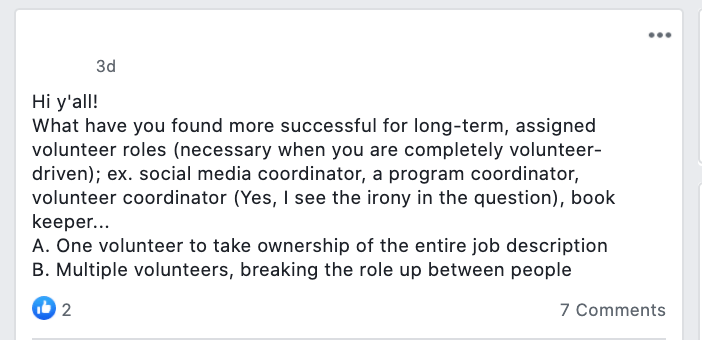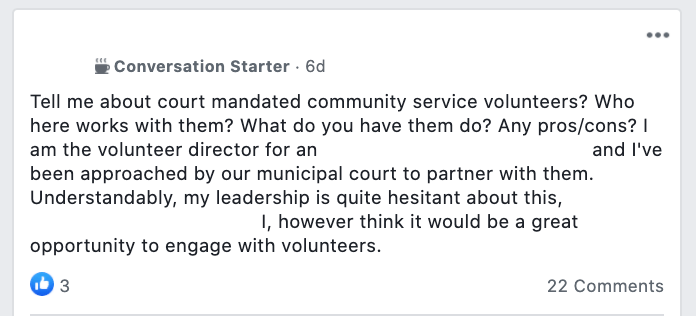Volunteer Coordinator Resource Community Weekly Recap: August 31 - September 6
As more virtual volunteering has taken place, or many organizations are unable to provide in-person volunteer opportunities, there have been many changes that are occurring to volunteer roles. Especially those volunteers who have established themselves as long-term volunteers and like to take on a good amount of volunteer responsibility.
So, when is it better to offer long-term volunteer opportunities versus break up a large volunteer project into smaller tasks for multiple volunteers?
The answer can really depend on your organization’s existing volunteer base. Do you have volunteers who want to become long-term volunteers or spend the majority of their time on a volunteer project? Or, do you have the type of projects and things that need to be done that you could offer up to just one person?
Depending on your volunteer program’s workload and volunteer base, long-term volunteer opportunities may be plentiful, or not so much.
Let’s see what our Facebook Community had to say about long-term volunteer opportunities in their organizations.

Comments on Long-Term Volunteer Opportunities
“I tried putting out the 'one volunteer per job' idea and our volunteers scattered from it. It's a lot of work to ask of an unpaid volunteer. “
“With the small roles broken up between people, they can form teams to support each other in those roles and be in charge of one aspect.”
“I will often offer the bigger role as a promotional opportunity for volunteers who do exceptionally well in a smaller role. This has worked pretty well in my program. Of course, it depends largely on individuals.”
“I create a role to suit the volunteer rather than the other way round, that's part of our mission. Every single time I try to fill a specific role the volunteer ends of leaving after a short time.”
Resources For Deciding on Long-Term Volunteers VS Short-Term Opportunities
Find out what type of volunteers you have and who does most of the volunteer work.
Use Info Sessions to gauge what type of work volunteers are looking for - short-term or long-term
See the post for yourself here, and feel free to add comments on long-term volunteer opportunities.
Another way that long-term volunteers can be incorporated into your organization is virtually, or working freelance. This is something to consider when implementing virtual volunteerism into your organization!

Virtual Volunteering is a great way to gather more volunteers in any capacity. It probably will not be a type of volunteering that goes away after the pandemic settles. So, how exactly can you implement virtual volunteers and manage them effectively?
Check out Advice From The Comments On Virtual Volunteer Management
“I work in dementia care and we have volunteers running Recreation zoom groups online for us. So far they are loving having the leadership roles and our clients are really enjoying the groups.”
“I'm new to virtual volunteers doing tutoring via Zoom. The most awkward part so far is having to negotiate time zone differences. We're mostly communicating vial email and did orientation by Zoom. So far so good!”
“We have having volunteers assist English language learners around the world with conversational practice. They all join a main session at the class time and then the host breaks them out into breakout rooms. Provides a little more structure and accountability by having them in a specific class meeting.”
“My volunteers do project planning and collaboration, events, training and social events.
So, it seems like you may just have to coordinate a bit of extra time to go over the virtual volunteer’s work!
Resources on Virtual Volunteer Management
And lastly, one of the Volunteer Coordinators in the group brought up court-mandated volunteers. A lot of different states and counties have regulations on what type of volunteering a court-mandated individual can do for it to count towards their hours. If your organization is on that list, how do you handle court-mandated volunteers?

Insight From The Comments On Partnering With Court-Mandated Volunteers
“We specified no violent crimes, theft, or crimes against animals or children. Our community service volunteers help out on Sundays, which is our designated only day that we don't have clients or other volunteers on the property. They get a ton done for us, like maintenance projects or landscaping, stripping out the horse stalls, misc outdoor tasks. We love having a partnership with them.”
“I have worked with them. I am at a low barrier homeless shelter. Most people have assured me that community service hours are mostly given to those with minor misdemeanors . As stated above, you can also specify a volunteer cannot have record of violent crimes, theft, and those against animals and children.”
“These volunteers don't flake out because they know if they don't show up for their shift, I call their probation or parole officer and they can potentially go back to jail.”
“We’ve had some court-mandated volunteers and I think it’s a great idea! We serve young children as well (we offer services for those who have been sexually victimized) so we just made sure their offenses didn’t involve sex crimes or crimes against children. Most of ours just do clerical work for us!”
“I run a court-ordered program under my volunteer program. Each of our 4 areas determines what offenses they will and won't accept. My office does the screening and placement, recording keeping, etc. These applicants are not covered under our insurance/workman's comp policy so our waiver indicates that. We get from 10 hours up to 200+ hours depending on the offense. We sometimes have issues with attendance, dress code, falsifying timesheets, etc. but the majority of the time they just want to get the work done and move on. I've definitely been cussed at by them over the phone, hung up on but after 12 years, it's only been a few times.”
“For us, offering folks a way to avoid a criminal charge or work through their parole is part of our mission. Our organization works with the local restorative justice society, so we get referrals of folks that are usually doing service to avoid a minor charge. We've had at least one person on probation do service, too. He worked as a client helper at the food bank. During the interview process, we have to ask about the nature of their offense so that we can place them appropriately. If there is any kind of serious charge, if I think the individual is okay, I run it past the corps officer, and they may want to meet with the individual. Interestingly, these referrals are some of the only volunteers for which we don't require criminal record checks. We simply confirm with the parole officer or referring agency that the individual hasn't committed any violent offenses.”
“I agree with only allowing certain offenses (AND noting they can't have PAST offenses under those categories). The majority of our CS workers were DUIs and small drug possession. I will say to have very clear scheduling and training on the front end, even more so than your normal volunteer program. There are some amazing CS workers, some competent ones, and the few that will do the bare minimum and/or not follow the rules to get their hours done, so having very clear communications, scheduling and expectations is essential.”
There are way more comments on this topic that would fill up this page- check them out here!
We think our Facebook group is the best resource for bringing up and talking about topics like these! Don’t hesitate to post about anything that is on your mind, you will get great feedback!
 Last updated by
Last updated by